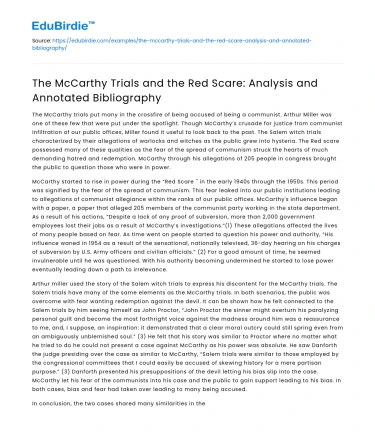The McCarthy trials put many in the crossfire of being accused of being a communist. Arthur Miller was one of these few that were put under the spotlight. Though McCarthy’s crusade for justice from communist infiltration of our public offices, Miller found it useful to look back to the past. The Salem witch trials characterized by their allegations of warlocks and witches as the public grew into hysteria. The Red scare possessed many of these qualities as the fear of the spread of communism struck the hearts of much demanding hatred and redemption. McCarthy through his allegations of 205 people in congress brought the public to question those who were in power.
McCarthy started to rise in power during the “Red Scare '' in the early 1940s through the 1950s. This period was signified by the fear of the spread of communism. This fear leaked into our public institutions leading to allegations of communist allegiance within the ranks of our public offices. McCarthy's influence began with a paper, a paper that alleged 205 members of the communist party working in the state department. As a result of his actions, “Despite a lack of any proof of subversion, more than 2,000 government employees lost their jobs as a result of McCarthy’s investigations.”(1) These allegations affected the lives of many people based on fear. As time went on people started to question his power and authority, “His influence waned in 1954 as a result of the sensational, nationally televised, 36-day hearing on his charges of subversion by U.S. Army officers and civilian officials.” (2) For a good amount of time, he seemed invulnerable until he was questioned. With his authority becoming undermined he started to lose power eventually leading down a path to irrelevance.
Save your time!
We can take care of your essay
- Proper editing and formatting
- Free revision, title page, and bibliography
- Flexible prices and money-back guarantee
Arthur miller used the story of the Salem witch trials to express his discontent for the McCarthy trials. The Salem trials have many of the same elements as the McCarthy trials. In both scenarios, the public was overcome with fear wanting redemption against the devil. It can be shown how he felt connected to the Salem trials by him seeing himself as John Proctor, “John Proctor the sinner might overturn his paralyzing personal guilt and become the most forthright voice against the madness around him was a reassurance to me, and, I suppose, an inspiration: it demonstrated that a clear moral outcry could still spring even from an ambiguously unblemished soul.” (3) He felt that his story was similar to Proctor where no matter what he tried to do he could not present a case against McCarthy as his power was absolute. He saw Danforth the judge presiding over the case as similar to McCarthy, “Salem trials were similar to those employed by the congressional committees that I could easily be accused of skewing history for a mere partisan purpose.” (3) Danforth presented his presuppositions of the devil letting his bias slip into the case. McCarthy let his fear of the communists into his case and the public to gain support leading to his bias. In both cases, bias and fear had taken over leading to many being accused.
In conclusion, the two cases shared many similarities in the way they were presented and grew out of hand. Arthur used the Salem trials as a way to show the hypocrisy of the McCarthy trials taking inspiration from some of what he was experiencing. Fear and bias lead to the hysteria that often looks to false evidence to prove something that might not even be there. To become stronger as a society is good to look back to the past so we do not repeat the same mistakes.
Bibliography
1History.com Editors. “Joseph McCarthy.” History.com, A&E Television Networks, 29 Oct. 2009, www.history.com/topics/cold-war/joseph-mccarthy#section_3. ‘
This source is useful because it comes from a trustworthy publication. The main reason I choose History.com is because of its in-depth but clear and concise explanation of the red scare and the McCarthy trials.
2 The Editors of Encyclopaedia Britannica. “Joseph McCarthy.” Encyclopædia Britannica, Encyclopædia Britannica, Inc., 10 Nov. 2019, www.britannica.com/biography/Joseph-McCarthy.
I chose Encyclopaedia Britannica as my second source because it was another trustworthy publication with a weighty name. This particular publication is bound to its authenticity so it is expected to be well researched. The article is well explained and concise, quick to the facts.
The Editors of Encyclopaedia Britannica explain that McCarthy started as quiet and mostly unknown. His main rise to prominence began with his letter of the 205 communists in our public offices. His power started to falter when he testified before the senate finding himself unable to point out any blatant communists. His rampage throughout the houses of the united states congress during this time was found popular from the public's perspective allowing him to continue carrying support. After his reelection, he gained the appointment of the chairmanship of the committee on the government's operations in the senate. Although he was not able to prove anyone communist his flowery language forced some people out of jobs.
3 Miller, Arthur. “Why Arthur Miller Wrote ‘The Crucible.’” The New Yorker, The New Yorker, 25 June 2019, www.newyorker.com/magazine/1996/10/21/why-i-wrote-the-crucible.
I choose this source for its reputable name and the direct interview with Arthur Miller. The words of Arthur allow the reader to see his perspective of the case getting to the direct answer of why he wrote “The Crucible.” The article was as well written later when the hysteria of the red scare had died down allowing him to speak freely.






 Stuck on your essay?
Stuck on your essay?

